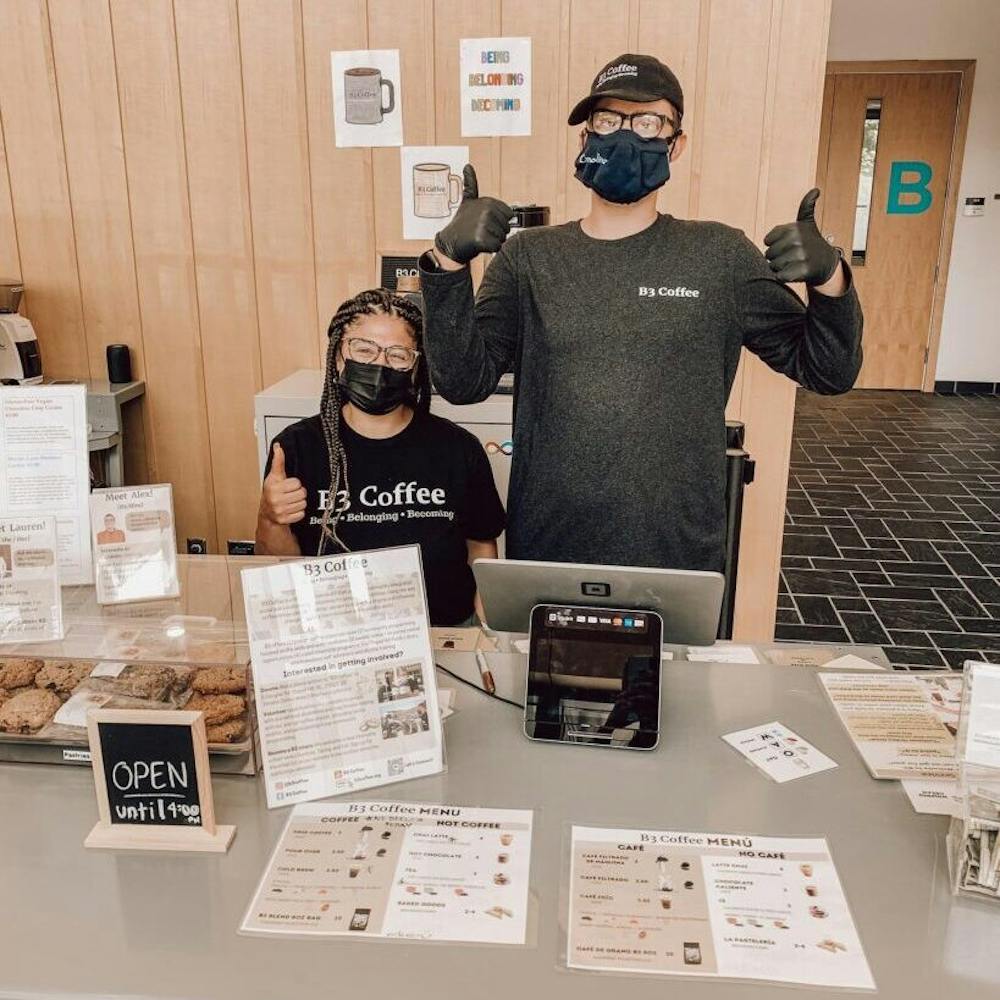Local non-profit B3 Coffee has found a fitting home in their kiosk at the Chapel Hill Public Library. Libraries, long-held as bastions of education and community congregation, provide individuals from all backgrounds the opportunity to connect with one another, learn and grow. B3 — using coffee as a means of providing community-integrated social and vocational opportunities for people of all abilities — is much the same.
The name B3, stemming from the organization’s three key values — being, belonging and becoming — speaks to their mission of increasing disability visibility, allyship, inclusion and ultimately, justice. Their pop-up coffee shops have serviced community venues across the Triangle since their inception in 2020, adding the kiosk at the Chapel Hill Public Library in the summer of 2022.
Located just beyond the sliding glass doors of the library entrance, the kiosk is impossible to miss. Equally impossible to miss are the patrons, lined up and eager to order their coffee, tea or fresh local pastries.
The baristas manning the counter are all B3 interns. This paid, 14-week internship is available to anyone 18 and up, regardless of ability level.
“Overall, we provide social and work opportunities for people with and without disabilities,” said Jacklyn Boheler, one of the founders. “ [Our] kiosk at the Chapel Hill Public Library serves as a transitional employment model.”
For individuals with disabilities, the internship is a launchpad into more permanent work opportunities. The program includes resume workshops, communication practice and training to help them identify their needs for support in the workplace. Interns gain skills in confidence and self-advocacy that they bring to their future roles — often at local businesses with whom B3 has partnered.
For allies, the internship provides valuable experience to work collaboratively in a neurodiverse environment. The role tends to attract people looking for an immersive experience in disability culture before entering a professional role in the medical or human services fields.
The internship is a microcosm of B3’s larger goal of finding common ground between people of all experiences. “[That’s] really how we can break down stigma,” she continued. “Through that initial exposure, which leads to connection and visibility in the community. [U]ltimately relationship building across neurotypes.”
B3 follows a non-hierarchical organizational structure. At all levels of the organization, people with disabilities are present and integral to the decision-making process. Non-disabled members all undergo allyship training, and B3 uses a universally designed model. “The onus of change shouldn’t always be on the disabled person to adapt to a society that isn’t always accessible,” Boheler said.
Since their inception in January 2020, B3 has grown into a rich and vibrant community, both on and offline. Boheler cites their online community, which first arose in response to the COVID-19 pandemic, as the impetus for expanding their reach to individuals for whom transportation presents a barrier.
Although their online community still runs strong, B3’s program offerings have expanded to include a variety of in-person events. One such program is ‘Living your Best Life,’ where participants build capacities in various areas of adult life, including wellness, budgeting and cooking. Their brimming social calendar also includes casual weekly coffee hours at the kiosk. This summer, B3 will launch a new program aimed at giving neurodivergent individuals the tools they need to navigate the digital world.
Boheler, alongside fellow UNC-Chapel Hill students Greg Boheler and Hannah Steen, formed B3 after meeting in their university’s chapter of Best Buddies — a non-profit dedicated to fostering friendship between neurotypical and neurodivergent individuals.
However, Boheler became dissatisfied with the charity-mindedness of the organization. She sought to create a space where friendships could be cultivated organically — one where people of all abilities had a say in the organization. Inspired by her role as a Starbucks barista, where she watched coffee bring people together, the trio decided to found B3.
When asked what B3 has in store for the future, Boheler mentioned expanding their network of local business partnerships. She also shared her hopes that B3 might eventually adopt a clubhouse model, which utilizes a permanent community center to provide members with opportunities to build long-term friendships, as well as providing them with education, employment and housing.
The coffee kiosk is open Thursdays, Saturdays and Sundays 10 a.m. to 4 p.m. at the Chapel Hill Public Library.
Get The Chronicle straight to your inbox
Signup for our weekly newsletter. Cancel at any time.

